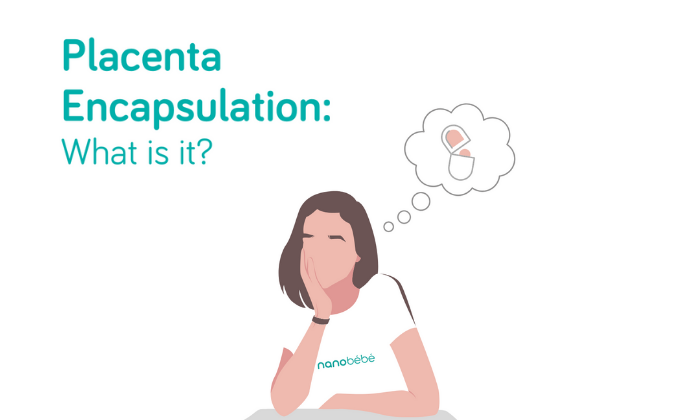
What Is Placenta Encapsulation?
Share

When people hear the term Placenta Encapsulation, a grossed out reaction often follows. Ewww! You wanna eat your placenta? I feel like when people hear about placenta encapsulation, they envision just cutting into your placenta and eating it (which….I mean, some people do). The process of encapsulation and consumption is actually pretty cool. Many of my students tell me that the process is much cooler than they had expected!
So, how does it work?
The placenta is (sometimes steamed) dehydrated, and then ground into a powder. The powder is used to fill empty gelatin capsules; and the capsules are consumed. Sometimes the powder is even used to make chocolates!

The placenta can also be made into a tincture.
Ground or raw placenta is placed into a glass bottle of 100 proof alcohol (like vodka) and is left to sit for at least 6 weeks. It is strained, and the mother places a few drops under her tongue as needed. A tincture allows mom to get the benefits even after her pills have been finished.

Now! Why would someone want to consume their placenta?
Well, there are many potential benefits. Yes! I said potential. You see; there haven’t quite been enough studies to be able to guarantee any specifics. Every placenta is unique to that individual. Levels of hormones are different for each person. Digestion and absorption is also something that is unique to each person. It may be a very long time before science can give enough evidence for exactly what amount of benefits the placenta offers.
For now, the studies that have been done, show mothers who have reported positive outcomes when it comes to:
Pain relief, adequate breast milk supply, increased energy, and better mood.
Mothers who decide to have their placenta encapsulated feel that there are so many potential benefits, and very minimal risks, that they feel it is worth doing.
Some people have concerns about the placenta being a waste organ. They worry if consuming the placenta means that they are consuming toxins. The truth is that the placenta is a facilitator organ. This means that the placenta is filtering the bad stuff out, and it leaves the body through the mother’s bloodstream. The placenta does however, is negatively impacted by toxins related to heavy smoking, drug use, and alcohol. So a mother who engages in those activities should not encapsulate her placenta.
Most people will be able to have their placenta encapsulated. So if you are interested in having your placenta encapsulated…..go for it!
*Nanobébé is thrilled to welcome guest bloggers. The views and opinions represented in these blog posts belong solely to the guest blogger and are not the legal responsibility of the company. The owner of this blog makes no representations as to the accuracy or completeness of the information provided by the guest blogger and will not be held liable for any errors or omissions of information nor for the availability of this information.
About the Author
Ashanti Rivera - Guest Blogger
 Ashanti Rivera is a wife, and homeschooling mama of 5. She is a doula and placenta encapsulation specialist/instructor and the owner of Woman’s Choice Perinatal Services and Woman’s Choice Charitable Association. Check out her website womanschoiceperinatal.com to find a placenta encapsulation specialist in your area or to take her distance training course. Also, check out her non profit info at womanschoiceperinatal.com/non-profit.
Ashanti Rivera is a wife, and homeschooling mama of 5. She is a doula and placenta encapsulation specialist/instructor and the owner of Woman’s Choice Perinatal Services and Woman’s Choice Charitable Association. Check out her website womanschoiceperinatal.com to find a placenta encapsulation specialist in your area or to take her distance training course. Also, check out her non profit info at womanschoiceperinatal.com/non-profit.
